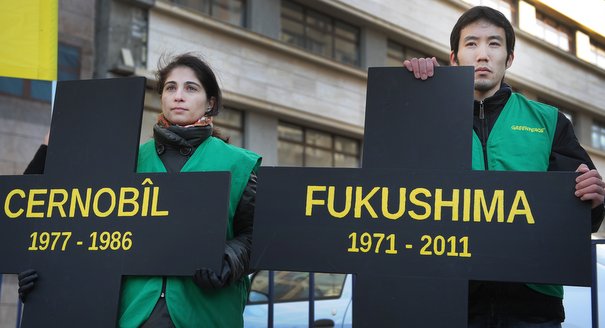{
"authors": [
"James M. Acton"
],
"type": "event",
"centerAffiliationAll": "",
"centers": [
"Carnegie Endowment for International Peace",
"Carnegie China"
],
"collections": [],
"englishNewsletterAll": "",
"nonEnglishNewsletterAll": "",
"primaryCenter": "Carnegie Endowment for International Peace",
"programAffiliation": "",
"programs": [],
"projects": [],
"regions": [
"Middle East",
"Iran",
"East Asia",
"South Korea",
"China",
"Japan"
],
"topics": [
"Security",
"Arms Control",
"Climate Change",
"Nuclear Policy"
]
}
Nuclear Safety After Fukushima
Tue, February 21st, 2012
Beijing
IMGXYZ3557IMGZYXOver the past 50 years, there have been three serious accidents at civilian nuclear power plants: Three Mile Island, Chernobyl, and most recently, Fukushima Daiichi. The latter two resulted in major releases of radiation. Improvements in nuclear safety are required if nuclear power is to become socially acceptable. Fukushima serves as an important case study to understand how far nuclear safety can be improved.
In anticipation of the one year anniversary of the Fukushima disaster, Carnegie’s James Acton discussed the accident and its implications for nuclear safety at an event hosted jointly by the Carnegie-Tsinghua Center for Global Policy and the Foreign Correspondents Club of China.
What Happened
- Poor Implementation of Best Practices: Acton said that the Fukushima disaster could have been prevented if the plant’s owner and regulator had followed international best practices and standards. He argued that because the problem was the failure to implement relevant guidelines—rather than the guidelines themselves—there is good reason to believe nuclear energy can be made much safer.
- Failures of the Regulator: Japan’s Nuclear and Industrial Safety Agency (NISA), which is responsible for regulating the country’s nuclear industry, suffered from various weaknesses, including a lack of independence from government and industry and a “lack of imagination” about potential threats, Acton said.
- Ignoring the Evidence: Furthermore, Acton said, the Tokyo Electric Power Company (TEPCO)—the electric utility that owned the Fukushima Daiichi Plant—had weaknesses in its approach to hazard assessment, including the failure to pay sufficient attention to historical evidence of tsunamis in the region. To compound the problem, NISA did not review a tsunami analysis performed by TEPCO.
- The Implausibility of an Accident: The belief that a major accident was simply not likely was one underlying cause of the weaknesses in both TEPCO’s and NISA’s approaches to safety, Acton said. He observed that Japanese utility companies argued that they should face unlimited liability in case of an accident in order to convince local people that there was no risk associated with nuclear power. Partly because of this belief, NISA or TEPCO failed to establish robust contingency plans.
Impact on Global Nuclear Energy Production
- China: Since the Fukushima disaster, China has not authorized the start of construction on any new nuclear reactors, Acton said. It now appears set to announce that all future reactors will be generation III rather than generation II units. Acton pointed out that recent high-speed rail crashes in China indicate the potential risks associated with rapidly deploying a new technology. He suggested that the Fukushima accident provides China with a warning about the importance of a strong, independent regulator to avoid similar accidents in its nuclear sector.
- Globally: Many European countries have taken note of the lessons to be learned from Fukushima, announcing stricter regulations based on ‘stress-tests’ to ensure that their plants can withstand natural disasters, including earthquakes and flooding, Acton added.
- Iran and North Korea: One journalist raised the question about nuclear safety standards in Iran and North Korea. Acton observed that Iran’s nuclear regulatory body is not independent and that Iranian officials declared that a repeat of the Fukushima accident could never happen there—a worrying indicator of complacency about nuclear safety. North Korea is building a light-water reactor at Yongbyon with no external input and thus without the benefit of more than 50 years of experience enhancing nuclear safety. Acton expressed serious concern and suggested the possibility of cooperation with North Korea on nuclear safety issues.
Nuclear Safety in the Future
- The Fukushima Clean-up: The scale of the clean-up operation facing Japan is unprecedented and it is yet to begin in earnest, so it is hard to predict how much the clean-up will cost or how long it will take, Acton said. Estimates suggest that it will require three to four decades and cost upward of 100 billion USD.
- Viability of Nuclear Energy: Asked whether nuclear energy should be phased out, Acton observed that every form of energy generation carries risks. Thousands of people in China die each year from coal mining accidents, while a greater number die from diseases caused by pollution from burning coal. He emphasized that in order to combat climate change all forms of low-carbon energy are needed.
- Global Regulation: Another audience member asked if there was a need for an international regulatory body. Acton argued that although international cooperation is highly desirable, international enforcement is not since it is likely to be weaker than national systems. Acton further asserted there was a risk that international enforcement could create a moral hazard: if states delegate responsibility for safety to an international body, they may become less likely to ensure the safety of their own plants.
- Lessons to be Learned: One of Acton’s key arguments was that countries should never become complacent about nuclear safety and all states have important lessons to learn from the Fukushima accident. Moving forward, it is crucial that all countries with nuclear energy programs constantly update and adapt their regulatory and safety frameworks and have viable contingency plans in place, Acton asserted.
Carnegie does not take institutional positions on public policy issues; the views represented herein are those of the author(s) and do not necessarily reflect the views of Carnegie, its staff, or its trustees.
